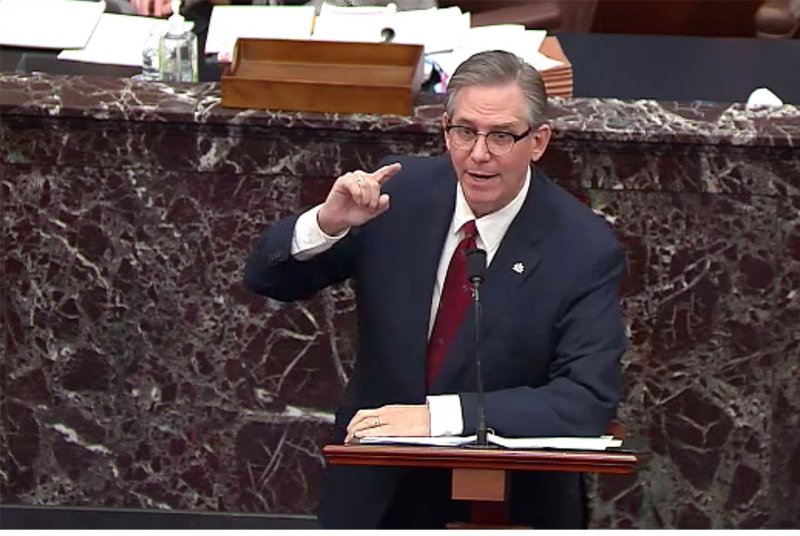1 of 6 | Bruce Castor, defense attorney for former President Donald Trump, speaks Friday during Trump's second impeachment trial on Capitol Hill in Washington DC, on Friday. Photo courtesy of the U.S. Senate/UPI |
License Photo
Feb. 12 (UPI) -- The fourth day of the Senate's second impeachment trial of former President Donald Trump came to a close Friday after House Democrats and the defense team took questions from senators seeking to determine whether he incited the Jan. 6 attack on the Capitol.
Trump's defense lawyers finished up their rebuttal around 3 p.m., taking a fraction of the 16 hours allotted to them.
After a short recess, the trial entered the question-and-answer phase, allowing senators to pose written questions to both the Democratic impeachment managers and Trump's defense. The Senate convened around 6 p.m. and is expected to pick things back up around 10 a.m. Saturday.
CNN reported the final vote in the trial could come around 3 p.m. It would take two-thirds of the Senate to vote for a guilty verdict in order to convict Trump. If they do, they'll next take up a vote on whether he should be barred from ever running for office again.
That timeline could be complicated, though, if the chamber votes to call witnesses, The Washington Post reported.
The first question came from Senate Democratic leader Chuck Schumer and Sen. Dianne Feinstein, D-Calif., who asked the impeachment managers: "Isn't it the case that the violent attack and siege on the Capitol on January 6th would not have happened if not for the conduct of President Trump?"
Impeachment manager Rep. Joaquin Castro, D-Texas, replied that "Trump summoned the mob" that attacked the Capitol.
"Although he could have forcefully intervened to stop the violence, he never did. In other words, this violent, bloody insurrection that occurred January 6th would not have occurred but for President Trump," he added.
Sen. Marco Rubio, R-Fla., also posed a question calling into question whether convicting Trump would pose a dangerous precedent in future impeachment cases involving former officials. He said a future House could conceivably impeach former Secretary of State Hillary Clinton and put her on trial.
Lead House impeachment manager Rep. Jamie Raskin, D-Md., said the two cases couldn't be compared and noted that Trump was impeached while still in office.
In contrast to less forceful remarks he presented earlier in the week, Trump lawyer Bruce Castor opened Friday with some of Trump's favorite fiery phrases.
Calling the trial a politically motivated "witch hunt the left has engaged in over the past four years," a "sham impeachment" caused by "constitutional cancel culture," and blaming the attack on "Antifa," Castor rejected the House impeachment managers' previous two days of testimony.
Democrats argued earlier this week, with dozens of graphic video clips, that Trump's actions leading up to and during the attack incited the mob's deadly riot, which put lawmakers at risk and led to five deaths, including a Capitol Police officer.
"Nothing in the text [of Trump's speech] could ever be construed as encouraging, condoning, or enticing unlawful activity of any kind," Castor said Friday, adding that the crowd at the rally prior to the attack was encouraged to "exercise their rights peacefully and patriotically."
"To claim that the president in any way wished, desired or encouraged lawless or violent behavior is a preposterous and monstrous lie," Castor said.
Arguing that Trump was following precedent in protesting election results with more than 60 lawsuits, Castor played video clips of Democrats in 2017 objecting to Trump's electoral certification in Congress and referred to Democrat Al Gore's challenge in courts in the 2000 election.
He called the rioters who broke into the Capitol a "small group looking to engage in violent and menacing behavior" who "hijacked the event for their own purposes." Castor said the rioters were from varying political factions, who "pre-planned" the Capitol attack, asserting that the first person to be arrested was a "member of Antifa."
"You can't incite something that was already going to happen," Castor said.
Castor also returned to the defense that Trump's speech was protected under the First Amendment, saying that a conviction would threaten political speech. He dismissed as political rhetoric Trump's saying, "If you don't fight like hell you're not going to have a country anymore."
Castor also pointed at violent protests over the death of George Floyd over the summer in Portland, Ore., Washington, D.C. and elsewhere, saying that Democrats had not referred to those events as part of an "insurrection," and that Trump had consistently said he wanted "law and order" and offered to send in National Guard troops.
Attorney David Schoen complained that the impeachment trial was driven by the "hatred, vitriol and political opportunism" of House Democrats on the impeachment committee.
Schoen accused House impeachment managers of "selectively editing" the video they used earlier in the week and not releasing it early so defense lawyers could confirm its accuracy.
Schoen called the article of impeachment a "bullying tactic" and accused House managers of "hypocrisy."
Accompanied by multiple video clips, Schoen said Democrats also used expressions such as "we've got to fight" that could be considered violent -- for rhetorical purposes.
"On the face of it, Mr. Trump's words are not different than the figurative speech used by every one of the senators assembled today," he said.
Trump's team also includes attorneys Michael van der Veen and William Brennan.
After Trump's team finishes presenting its case, the Senate will have an opportunity to ask questions. The trial will then move to the witness and evidence phase, if Democrats plan to introduce any, before both sides make their closing arguments.
The trial is expected to last into next week.
Supporters of President Donald Trump riot against the Electoral College vote count on January 6, 2021, in protest of Trump's loss to President-elect Joe Biden, prompting a lockdown of the Capitol Building. Photo by Leigh Vogel/UPI |
License Photo
















